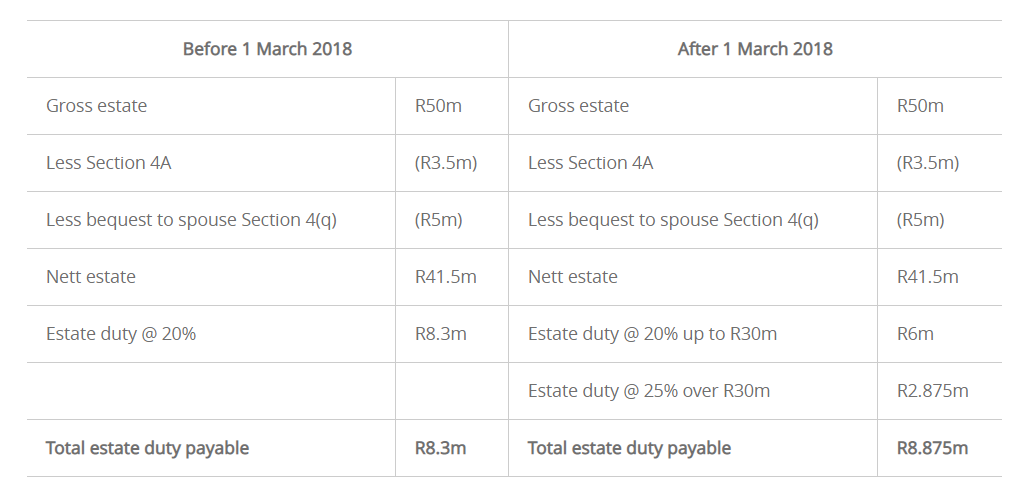Stay abreast of COVID-19 information and developments here
Provided by the South African National Department of Health
Estate duty:
what you need to know
Former Finance Minister Malusi Gigaba announced in his February Budget Speech that from 1 March this year, estate duty would be increased from 20% to 25% on the ‘dutiable value’ of estates over R30 million. For all other estates in excess of R3.5 million up to R30 million, it remains at 20%. But what exactly is this ‘dutiable value’, and what’s included when the amount you need to pay is determined? Here’s what you need to know.
Estate duty in South Africa is charged on the ‘dutiable estate’ of a deceased individual – in other words, all property after allowable deductions, which include debts, funeral and death-bed expenses, administration costs, property accruing to a surviving spouse, and the first R3.5 million of the value of the property. It’s levied on the property of deceased persons ordinarily resident in South Africa, as well as on the South African property of persons who don’t ordinarily live here.
In terms of Section 3(2) of the Estate Duty Act No 45 of 1955 (the Act), foreign property is – for the purposes of South African estate duty – included as property in the dutiable estate of a person who ordinarily lives in this country.
In terms of Section 4A of the Act, a deduction of R3.5 million is allowed when determining the amount of estate duty to be paid. Deductions are also allowed for liabilities, bequests made to qualifying public benefit organisations, and property accruing to surviving spouses – either in terms of a will or by intestate succession.
In respect of the estate of a person dying on or after 1 January 2009, all benefits – including lump-sum benefits, payable from South African pension, provident and/or retirement annuity funds – are not deemed as ‘property’, and therefore not subject to estate duty.
In terms of Section 3(3)(a) of the Act, the proceeds of a life insurance policy are seen as property in the estate of a deceased person, except if:
The life insurance policies referred to above include policies where a spouse or child are nominated beneficiaries, buy and sell policies, and key-person policies that conform to the conditions as set out in the Act. It’s important to note that endowment policies (local and offshore) that don’t pay out on the death of a life assured, but are owned or part owned by a deceased policyholder, will be subject to estate duty. The surrender value of the policy must be included as property in the deceased estate.
What are the practical implications of the estate duty rate increase as announced in the Budget Speech? The impact can be illustrated by the following example:
For an estate with a gross value of R50 million, with a bequest of R5 million to the surviving spouse:
The formation and registration of trusts, and the provision of independent trusteeships – both local and offshore.
The creation of BEE, charitable, special and Shariah trusts compliant with regulatory and legislative requirements.
The administration of deceased estates in South Africa and abroad.
Advice on complex structures, asset restructuring and bequests in foreign jurisdictions.
Advice on emigration and immigration, foreign earnings and the application of any double taxation agreements.
Updating trust deeds to ensure they’re in line with the latest changes in the trust environment.
Updating and/or drafting of wills dealing with South African and/or foreign assets.
Advice on the establishment and management of charitable organisations, their tax status and tax deductible donations.
Advice on the potential tax consequences and reporting obligations if you hold a US passport or green card, or if you have children living in the US.
Guidance on the financial implications of life-changing events, such as getting married, divorce or the birth of a child.

For further information or advice, please contact Ken Newport at kenn@privatewealth.sanlam.co.za or on 011 778 6659.
The formation and registration of trusts, and the provision of independent trusteeships – both local and offshore.
The creation of BEE, charitable, special and Shariah trusts compliant with regulatory and legislative requirements.
The administration of deceased estates in South Africa and abroad.
Advice on complex structures, asset restructuring and bequests in foreign jurisdictions.
Advice on emigration and immigration, foreign earnings and the application of any double taxation agreements.
Updating trust deeds to ensure they’re in line with the latest changes in the trust environment.
Updating and/or drafting of wills dealing with South African and/or foreign assets.
Advice on the establishment and management of charitable organisations, their tax status and tax deductible donations.
Advice on the potential tax consequences and reporting obligations if you hold a US passport or green card, or if you have children living in the US.
Guidance on the financial implications of life-changing events, such as getting married, divorce or the birth of a child.
Expert advice is crucial in dealing with cross-border estate and tax planning.
Stanley Broun has spent 13 years in Fiduciary And Tax.

Have a question for Stanley?
South Africa
South Africa Home Sanlam Investments Sanlam Private Wealth Glacier by Sanlam Sanlam BlueStarRest of Africa
Sanlam Namibia Sanlam Mozambique Sanlam Tanzania Sanlam Uganda Sanlam Swaziland Sanlam Kenya Sanlam Zambia Sanlam Private Wealth MauritiusGlobal
Global Investment SolutionsCopyright 2019 | All Rights Reserved by Sanlam Private Wealth | Terms of Use | Privacy Policy | Financial Advisory and Intermediary Services Act (FAIS) | Principles and Practices of Financial Management (PPFM). | Promotion of Access to Information Act (PAIA) | Conflicts of Interest Policy | Privacy Statement
Sanlam Private Wealth (Pty) Ltd, registration number 2000/023234/07, is a licensed Financial Services Provider (FSP 37473), a registered Credit Provider (NCRCP1867) and a member of the Johannesburg Stock Exchange (‘SPW’).
MANDATORY DISCLOSURE
All reasonable steps have been taken to ensure that the information on this website is accurate. The information does not constitute financial advice as contemplated in terms of FAIS. Professional financial advice should always be sought before making an investment decision.
INVESTMENT PORTFOLIOS
Participation in Sanlam Private Wealth Portfolios is a medium to long-term investment. The value of portfolios is subject to fluctuation and past performance is not a guide to future performance. Calculations are based on a lump sum investment with gross income reinvested on the ex-dividend date. The net of fee calculation assumes a 1.15% annual management charge and total trading costs of 1% (both inclusive of VAT) on the actual portfolio turnover. Actual investment performance will differ based on the fees applicable, the actual investment date and the date of reinvestment of income. A schedule of fees and maximum commissions is available upon request.
COLLECTIVE INVESTMENT SCHEMES
The Sanlam Group is a full member of the Association for Savings and Investment SA. Collective investment schemes are generally medium to long-term investments. Past performance is not a guide to future performance, and the value of investments / units / unit trusts may go down as well as up. A schedule of fees and charges and maximum commissions is available on request from the manager, Sanlam Collective Investments (RF) Pty Ltd, a registered and approved manager in collective investment schemes in securities (‘Manager’).
Collective investments are traded at ruling prices and can engage in borrowing and scrip lending. The manager does not provide any guarantee either with respect to the capital or the return of a portfolio. Collective investments are calculated on a net asset value basis, which is the total market value of all assets in a portfolio including any income accruals and less any deductible expenses such as audit fees, brokerage and service fees. Actual investment performance of a portfolio and an investor will differ depending on the initial fees applicable, the actual investment date, date of reinvestment of income and dividend withholding tax. Forward pricing is used.
The performance of portfolios depend on the underlying assets and variable market factors. Performance is based on NAV to NAV calculations with income reinvestments done on the ex-dividend date. Portfolios may invest in other unit trusts which levy their own fees and may result is a higher fee structure for Sanlam Private Wealth’s portfolios.
All portfolio options presented are approved collective investment schemes in terms of Collective Investment Schemes Control Act, No. 45 of 2002. Funds may from time to time invest in foreign countries and may have risks regarding liquidity, the repatriation of funds, political and macroeconomic situations, foreign exchange, tax, settlement, and the availability of information. The manager may close any portfolio to new investors in order to ensure efficient management according to applicable mandates.
The management of portfolios may be outsourced to financial services providers authorised in terms of FAIS.
TREATING CUSTOMERS FAIRLY (TCF)
As a business, Sanlam Private Wealth is committed to the principles of TCF, practicing a specific business philosophy that is based on client-centricity and treating customers fairly. Clients can be confident that TCF is central to what Sanlam Private Wealth does and can be reassured that Sanlam Private Wealth has a holistic wealth management product offering that is tailored to clients’ needs, and service that is of a professional standard.